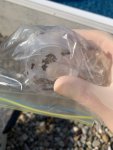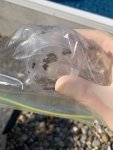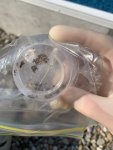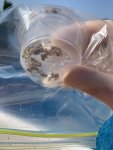Hello everyone,
Several years ago I found what I assumed to be a raccoon poop in the pool. I skimmed it out and shocked the pool and didn’t really worry about it.
Just now I got in the pool and was walking around vacuuming with a pool blaster (battery operated vacuum with its own filter bag) and I sucked up what I believe to be a raccoon poop. I immediately got out and checked the bag, there was brown mush along with a bunch of undigested seed as well as maggots? Maybe?
I immediately started googling what to do and came across Raccoon Roundworm aka baylisascaris. I read that the eggs aren't killed by chlorine. The CDC recommends taking the poop sample to be tested for baylisascaris. It can be transmitted to humans and is fatal. I already washed out my filter bag so I have no sample to take. The cleaning method if you find raccoon feces in your pool is to drain, wipe down walls and refill and replace filter media.
Can anyone please help me? I am freaking out. I'm afraid I got their eggs on me because I was in the pool and I'm going to contract this illness. Do I really need to drain the entire pool and replace the sand? Am I freaking out over nothing?
Everything I've found regarding humans contracting it is that they have to consume a large quantity of the eggs and its extremely rare. But if its so rare and you have to consume a large quantity of the eggs, why does the CDC recommend such drastic measures for cleaning the pool?
Please someone help!
Several years ago I found what I assumed to be a raccoon poop in the pool. I skimmed it out and shocked the pool and didn’t really worry about it.
Just now I got in the pool and was walking around vacuuming with a pool blaster (battery operated vacuum with its own filter bag) and I sucked up what I believe to be a raccoon poop. I immediately got out and checked the bag, there was brown mush along with a bunch of undigested seed as well as maggots? Maybe?
I immediately started googling what to do and came across Raccoon Roundworm aka baylisascaris. I read that the eggs aren't killed by chlorine. The CDC recommends taking the poop sample to be tested for baylisascaris. It can be transmitted to humans and is fatal. I already washed out my filter bag so I have no sample to take. The cleaning method if you find raccoon feces in your pool is to drain, wipe down walls and refill and replace filter media.
Can anyone please help me? I am freaking out. I'm afraid I got their eggs on me because I was in the pool and I'm going to contract this illness. Do I really need to drain the entire pool and replace the sand? Am I freaking out over nothing?
Everything I've found regarding humans contracting it is that they have to consume a large quantity of the eggs and its extremely rare. But if its so rare and you have to consume a large quantity of the eggs, why does the CDC recommend such drastic measures for cleaning the pool?
Please someone help!








